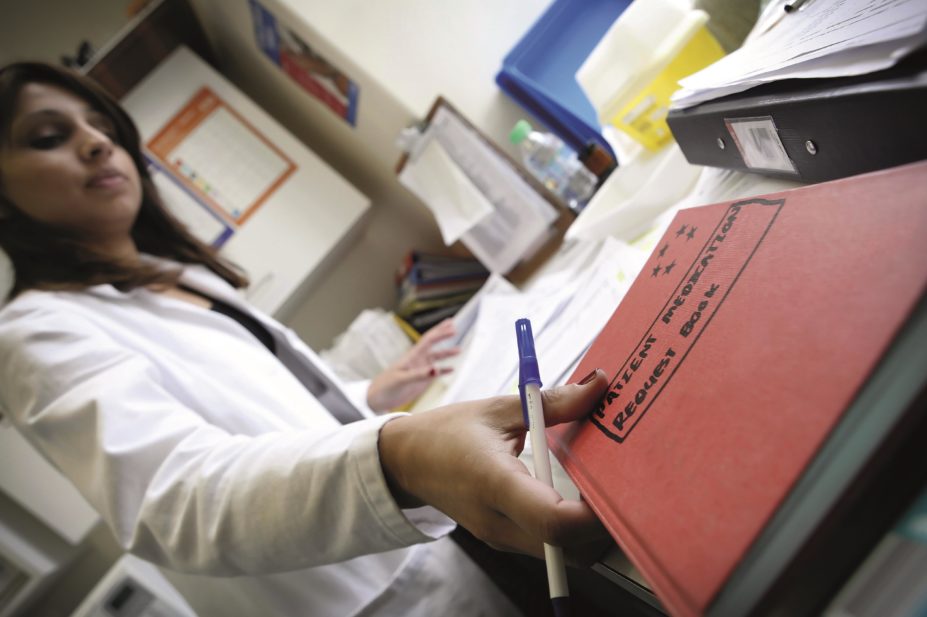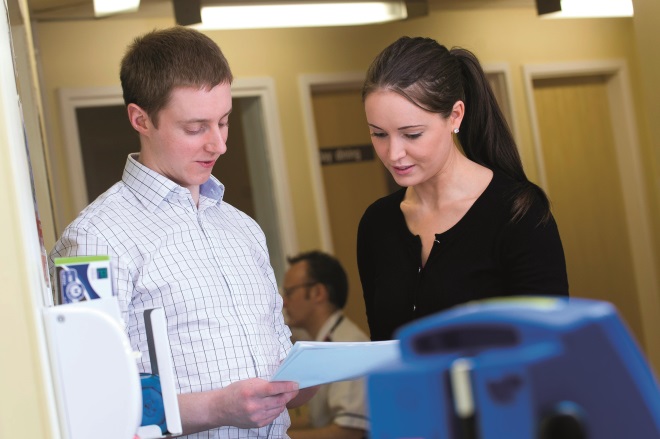
Medicimage / REX images
“Our ethos is: every pharmacist who can prescribe, should prescribe,” says Wasim Baqir, research and development pharmacist at Northumbria Healthcare NHS Foundation Trust.
His organisation has been working for more than a decade to make this a reality. Today, more than 80% of its 44 clinical pharmacists prescribe or are training to become an independent prescriber. Most of those who are not prescribing are newly qualified pharmacists who are not yet eligible for training.
David Campbell, chief pharmacist at the trust, says it has such belief in independent prescribing that the qualification is now essential to work at the trust. “It’s a condition of employment,” he says.
In 2014, Baqir, Campbell and colleagues published a paper in the European Journal of Hospital Pharmacy
which showed that, in a sample of 1,415 pharmacist-prescribed medication orders across the trust’s three hospitals, there was an error rate of just 0.3%.
The paper was confirmation of a vision that has helped to reduce medicines errors and omissions, lessen the delays they cause, and integrate pharmacists into clinical teams across the trust’s hospitals.
RPS backs prescribing role
“We see a great future for independent prescribing and the capacity and capability this adds to a multidisciplinary team as pharmacists take on these new roles, so we’re fully supportive of schemes like Northumbria,” says Heidi Wright, Royal Pharmaceutical Society (RPS) practice and policy lead.
As of 9 March 2015, there were 3,150 independent prescribers on the GPhC register, as well as 440 supplementary-only prescribers. The RPS has pledged to support more members to become prescribers, and provides resources and events for those seeking to qualify.
“The fact that Northumbria [trust is] moving at both pace and scale is something we hope the NHS will notice and apply in other healthcare settings,” says Neal Patel, RPS head of corporate communications.
The hospital trust began its journey towards pharmacist prescribing in the early 2000s, prior to national medicines reconciliation guidance.
“Our intelligence showed we had a major weakness within the process of hospital admission,” says Campbell. “We also recognised that doctors were making prescribing errors, often as they were without the information they needed, or omitting medicines from the lists, because of the admissions process.”
As a result, pharmacists had to flag up the omissions and errors and go back to the doctor to put them right. The trust realised that removing one step in this complex chain would avoid the duplication of effort required to correct these mistakes and omissions. The answer? Let the pharmacists prescribe.
“When supplementary prescribing came about [in 2003], we made a conscious decision within our senior team that we were going to put as many pharmacists as we possibly could through the qualification,” says Campbell.
Errors reduced
When the trust placed supplementary prescribers in admissions units, medicines errors associated with admission fell significantly, as did delays incurred in correcting errors, Campbell says.
Baqir explains: “The early data was really the driver to start expanding this approach, not just to our emergency admissions unit, but to the rest of the hospital as well.”
Campbell’s team anticipated the direction of travel and, when independent prescribing arrived in 2006, the trust was quick to upskill its pharmacists. This reduced the need to refer back to the prescribing doctor, further streamlining clinical processes.
“Because our error rate is so low, we’ve made a conscious decision now that pharmacists aren’t having to have their prescribing checked, where nearly everywhere else in the organisation we continue to check prescribers’ work,” adds Campbell, though pharmacists can still ask colleagues to review complex prescriptions.
His team now aims to increase the amount of prescribing by their pharmacists as the trust shifts to seven-day working, and to explore new clinical roles in areas such as A&E, general practice, care homes and domiciliary care.
Although Campbell believes the evidence in favour of pharmacist independent prescribing is now clear, he still encourages further research to build an even stronger evidence base for the role. Baqir encourages the RPS to place a “stronger emphasis” on promoting the benefits of pharmacist prescribing roles to the wider NHS.
“It’s actually brought us closer to the wider clinical team, because it got us integrated within it to make that sort of contribution to patient care,” Campbell concludes.
A good career move?

Source: Northumbria Healthcare NHS Foundation Trust
Pharmacist independent prescribers are now a common sight across Northumbria Healthcare NHS Foundation Trust’s three hospitals
David Campbell and Wasim Baqir believe an independent prescribing qualification is a valuable addition to a pharmacist’s CV.
To qualify, a pharmacist must complete a GPhC-accredited training programme, which is typically taken part-time over six months.
“If you can get on to a prescribing qualification course as early in your career as possible, it’s only going to be a good thing for you,” says Baqir. “It gives an increasing level of confidence to work as an independent practitioner.”
Campbell hopes the elements within the proposed integrated five-year pharmacy degree will allow trusts to quickly upskill new pharmacists to full independent prescriber status. But he says pharmacists should not fear the growth in the workforce — in fact, a shortage of prescribers could become a barrier to the trust’s goals, he says.
“If we develop [pharmacy students] in the way that we’re talking about, we’ll be able to fill lots of these prescribing roles,” says Campbell. “But it will only happen if leaders within the profession — including the Royal Pharmaceutical Society — recognise this opportunity and drive forward the development [of prescribing roles].”
You may also be interested in
Long service of members

Membership fees 2022
